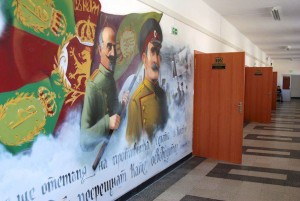My 12th graders have a huge range of goals, some are pursuing university in Bulgaria, while others will head to universities in the UK or Germany. An equal amount expect to go straight into the work force, domestically and abroad. A couple have expressed interest in the military.
As I was brainstorming for lesson plans, there was one writing assignment that stood out as being useful for every single one of them: resume writing.
I took the things I’ve learned from CP&R over the years, borrowed some tips and tricks from their page on the Scripps website, and adapted it for presentation to my high school students. We were able to practice work-related verbs and appropriate tenses (the difference between “filing documents” and “filling documents”). There was a lot of “what is it called in English if you are someone who does XYZ.”
My co-teacher and I printed out and distributed the “EuroPass” CV form, a common form used by employers throughout Europe. After having discussed the components and important parts of resume-writing the week before, we gave them the 45-minute class period to fill out the form and hand them back for evaluation.
Having an actual form in front of them allowed for more specific questions and gave us a space to problem-solve some of the issues unique to them. There’s no name for the qualification you have upon graduating high school in Bulgaria that would be equivalent to “high school diploma,” so they were unsure what to write on the line for “title of qualification.” We went over the Common European Framework of Reference for Languages, so they would know how to self-assess and report their language skills on their CV.
Most students here don’t have part-time or summer jobs, as their aren’t an abundance of jobs to go around. There weren’t even any babysitters in the group, as families here generally can’t afford to hire them. With this in mind, we thought about how they can interpret the experiences and occasional job they do have for use on a resume. Among my group we had a class representative, a freelance sports writer, Guinness World Record-holding bagpiper, and mushroom factory worker.
Even if they never need to write a CV or resume in English, I hope the exercise of thinking about their strengths, abilities and experiences will be helpful wherever they scout for jobs. And for those of my students who will be applying to jobs and universities abroad, this was a good start for them to think about how they represent themselves on applications in another language.
How do I know it was a success?
Other teachers heard about the lesson, and asked me to work through it with their classes as well. When suffering from culture shock and trying to survive the first year of teaching, there’s nothing better than the feeling that you’ve done something right. Many thanks to CP&R for teaching my resume-writing skills. Now I can pay it forward.

